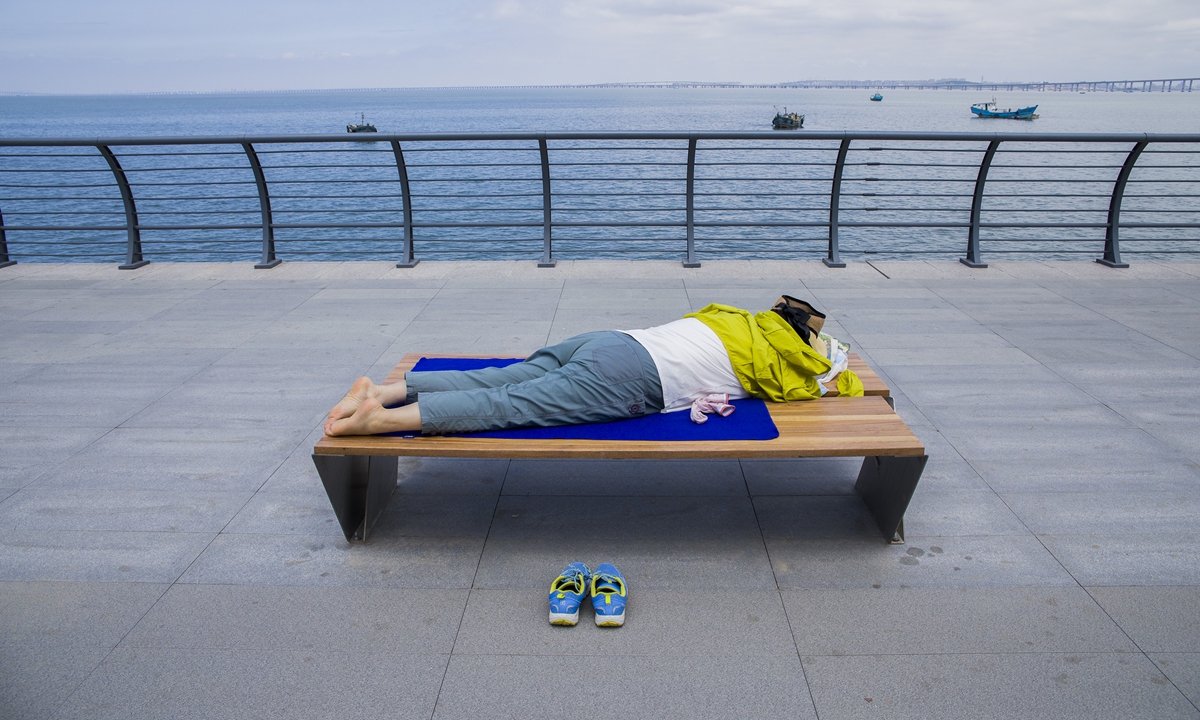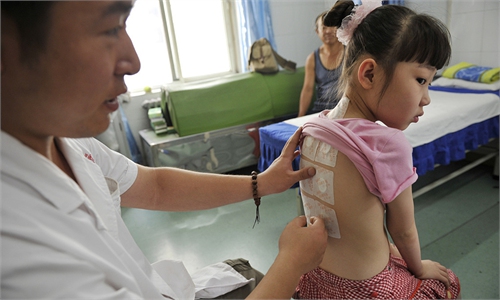ARTS / CULTURE & LEISURE
Chinese youths embrace back sunbathing during scorching summer heat

A woman does back sunbathing in East China's Shandong Province on June 20. Photo: VCG
As most parts of China are suffering from the scorching summer heat, a new wellness trend has emerged among Chinese youths: back sunbathing.
A recent social media post claims that a woman lost two kilograms after sunbathing on her rooftop for 10 days, attributing her weight loss to 30 minutes of daily sun exposure, which she also said improved her eyesight.
The hashtag "Sunbathe 10 days, lose 2 kilograms" quickly went trending on China's X-like platform Sina Weibo, garnering more than 200 million views and 35,000 messages by Tuesday afternoon.
China has just experienced sanfu, also called "dog days of summer," which refers to three 10-day periods that are predicted to be the hottest days of the year. In traditional Chinese medicine (TCM), sanfu is considered a particularly suitable time for treating illnesses.
On the lifestyle-sharing platform Xiaohongshu, a search for "back sunbathing during sanfu" yields over 20,000 posts, while a query for "proper methods of back sunbathing" results in more than 2,000 entries. Many users document their daily routines, share positive outcomes and provide educational insights about this practice.
Meanwhile, some netizens have turned their attention to the Flaming Mountain in Northwest China's Xinjiang Uygur Autonomous Region, where ground temperatures have recently soared to 81 C. They come to the place to bury their legs in the sand to get rid of humidity, a practice known as qushi in Chinese.
In TCM, dampness or high humidity in the body is believed to be the root cause of many diseases including respiratory issues, according to the Xinhua News Agency. Eliminating this excess moisture is considered beneficial for one's health.
The hashtag "Flaming Mountain qushi trip" has been circulating online, drawing visitors to Turpan in Xinjiang for its purported health benefits. Viral videos online show that visitors bury their legs in the sand, claiming this practice will reduce the humidity level of their bodies.
Some social media users claimed an array of health benefits originating from their visits to the Flaming Mountain such as clearing of their acne, reduced blackheads, alleviated menstrual pain, and even a slimmer waistline.
But does this wellness trend hold any scientific merit? Luo Chaofan, a rehabilitation therapist at the National Health Commission, told the Global Times on Tuesday that "there is some TCM basis to the practice of back sunbathing."
"Women experience rapid calcium loss during their menstrual periods, and sunbathing can promote calcium absorption," Luo said. "Additionally, sunbathing can stimulate hormone secretion and reduce fatigue. The practice can be done in any season as long as there is sunlight."
However, Luo emphasized that the supposed weight loss from sunbathing lacks scientific evidence. "The perceived weight loss from sunbathing is actually due to sweating and loss of body fluids, not fat loss."
While back sunbathing might offer certain benefits, it is not suitable for everyone. Luo warned that individuals allergic to ultraviolet rays or those with dermatitis should avoid sunbathing.
Additionally, those who work outdoors in the sun, people with underlying health conditions like hypertension or coronary heart disease, pregnant women, and young children should not engage in intentional back sunbathing. For these groups, regular sun exposure is sufficient.

